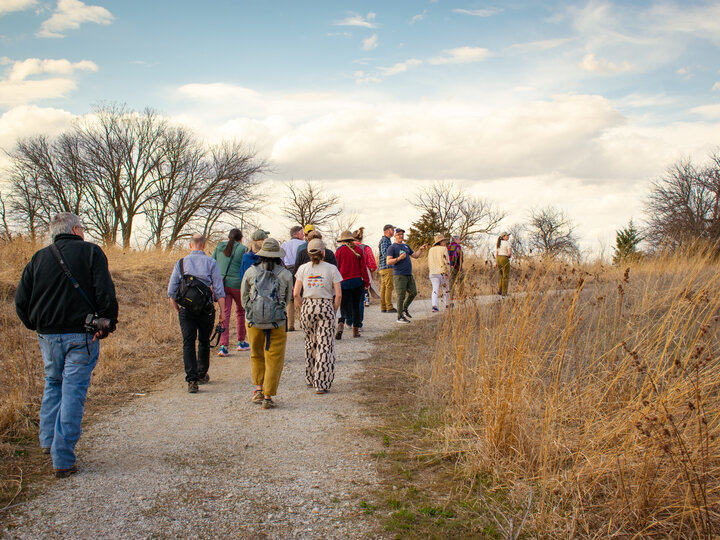50th annual Great Plains conference: April 8-10, 2025, Lincoln, NE
With millions of acres of fenced cropland, the Great Plains doesn’t seem like a wild place, but there is much to learn from the pockets of wildness left and the efforts to restore and protect the region’s landscape. This conference will examine the concept of wildness and what wild areas mean to human visitors and residents. Wild Great Plains will cover topics including restoration of bison herds, Indigenous-led environmental practices, grassland animals, urban wilderness, psychological aspects of nature, conservation action, nature art, and our connection with wildness. Alongside panel sessions, the conference will also feature experiential workshops on wildlife photography, mindfulness in nature, prairie plant and animal identification, and nature journaling.
Funding is provided by Humanities Nebraska and the Nebraska Cultural Endowment and these UNL entities: the School of Natural Resources, the Institute for Agriculture and Natural Resources, the Office of the Executive Vice Chancellor, the Cather Project, the Office of Research and Innovation, the Department of Ethnic Studies, and the Faculty Senate Convocations Committee. Presented in partnership with the Consulate General of Canada in Minneapolis.

Details
Locations:
- April 8: poster session at the Great Plains Art Museum, 1155 Q St.
- April 9 & 10: Nebraska Innovation Campus Conference Center, 2021 Transformation Dr.
- April 9 workshops and dinner: Spring Creek Prairie Audubon Center, 11700 SW 100th St, Denton, NE (additional tickets required)
Schedule is subject to change. Contact us at cgps@unl.edu
NU students use code GPstudent at checkout for $25 conference ticket. Does not include dinner/workshops.
Parking
April 8 opening reception and poster session: There is metered parking on the street and hourly parking at the Que Place parking garage at 11th and Q streets.
April 9-10: Conference parking is available in the lot north of Transformation Drive in Zone 9900 and is paid through the Passport Parking app.
Keynote speakers
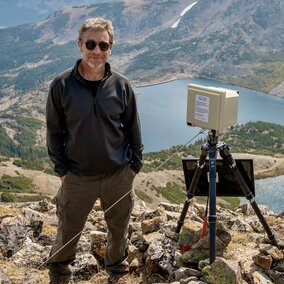
Michael Forsberg
Into Whooperland: A Photographer's Journey with the Rarest Crane in the World
"I've spent the last five years camera-in-hand exploring the natural history of whooping cranes across the continent, meeting people that love them, and discovering how these tall, magnificent and rarest of cranes are navigating our 21st century world. In this multimedia presentation, I'll take you on a wild, wonderful, and sometimes heartbreaking journey from their wintering grounds along the Texas Gulf Coast to their remote nesting grounds in northern Canada, and on migration through the heart of the Great Plains. I hope you'll join me."
Forsberg is a Nebraskan whose 30-year career as a photographer and conservationist has been dedicated to wildlife and conservation stories in North America's Great Plains, once one of the greatest grassland ecosystems on Earth. His images have been featured in publications including Audubon, National Geographic, Nature Conservancy, and Sierra magazines. His fine art prints are in public and private collections, and his solo exhibitions have traveled nationwide.
In 2011, Forsberg co-founded Platte Basin Timelapse (PBT) in partnership with UNL and Michael Farrell Photography and Fine Art. Today, it operates as a conservation storytelling project to inform scientific research, build educational content, and tell stories of a Great Plains watershed in motion. A documentary film for PBS, titled Follow the Water, based on the project and Mike's traverse across the Platte Basin watershed, was released on PBS nationally in 2019. Forsberg serves as faculty at UNL and is a Fellow with the Center for Great Plains Studies and the Daugherty Water for Food Institute.
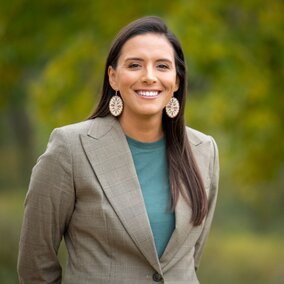
Ferin Davis Anderson
How Reciprocal Restoration Fosters Cultural Revitalization
Anderson will discuss reciprocal restoration and examples of how stewarding a place can lead to cultural revitalization within a community. "Reconnecting with traditional practices such as cultural burning is central in our connection with the land and lessening the impacts of devastating wildfires. Fire holds such power. It is our duty to acknowledge fire and to foster a good relationship. As our ancestors understood, the land will teach us."
Anderson is the co-author of Wildfire: The Culture, Science, and Future of Fire, a STEAM book exploring the science of wildfires, the history of fire in the United States, and the relationship Indigenous people have with fire. Anderson is an enrolled citizen of the Turtle Mountain Band of Chippewa/Ojibwe/Anishinaabe/Mitchifs in North Dakota. She is also the Natural Resources Manager for the Shakopee Mdewakanton Sioux Community’s Land and Natural Resources Department. Anderson is responsible for stewarding and restoring natural areas for the SMSC. She works to weave Indigenous knowledge and western science to implement holistic land stewardship practices. This includes using fire as an ecological and cultural tool to achieve beneficial and healing outcomes. Witnessing Indigenous people revitalize and reconnect with this practice has been one of the greatest gifts of her career. Anderson was also part of a team that helped bring bison back to the SMSC – a relative that will help the Community connect with the land and their culture.
Anderson's talk is free and open to the public without a conference ticket thanks to the UNL Convocations Committee and Humanities Nebraska and the Nebraska Cultural Endowment.
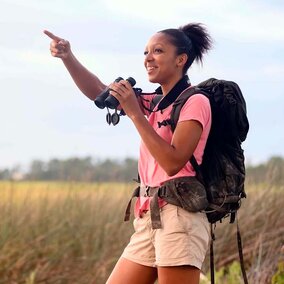
Corina Newsome
From the Cities to the Grasslands: Conservation as a Tool for Justice
About the talk: Harms exacted against human communities, especially Black, Indigenous, and Brown communities, have had cascading impacts on biodiversity and ecologies across the continent. As we face myriad multifaceted threats to people and wildlife, these very same communities hold the keys to a just, biodiverse, and equitable future where all people—and the diversity of life—can thrive.
Newsome, Associate Conservation Scientist at the National Wildlife Federation, is a wildlife biologist dedicated to the integration of environmental justice and conservation science and practice. Newsome earned her bachelor's degree in zoo and wildlife biology from Malone University and, after several years as an animal care professional, went on to earn her master's degree in biology from Georgia Southern University. With a specific passion for avian conservation, Newsome’s research focuses on answering landscape ecology questions that help us better understand how we can help birds thrive in a changing world. Newsome’s fascination with birds extends beyond her research and into the communities where she lives and works, serving as beautiful vehicles through which she connects herself and others to the world around them.
In addition to her work as a wildlife scientist, Newsome is committed to increasing the representation and visibility of Black science professionals for the next generation of STEM experts, and centering the leadership and perspectives of Black, Indigenous, and communities of color in wildlife conservation, environmental education, and exploration of the natural world. Photo by Katherine Arntzen.
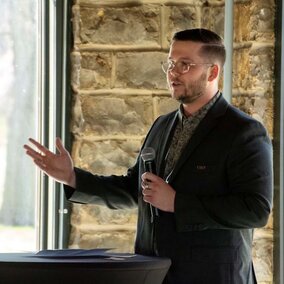
Brandon Cobb
Beyond Buffalo: Following our Relatives Towards Right Relations
This presentation will give an overview of The Nature Conservancy, their work in restoring Buffalo to Tribal lands in partnership with the Intertribal Buffalo Council and Tanka Fund, and the importance of this work, both with partners but also within the organization. Attendees will learn about the important cultural relevance of Buffalo, the impacts Buffalo have on prairies, and how The Nature Conservancy has been working to support the transfer of Buffalo from preserves back to Native lands.
Cobb joined The Nature Conservancy’s team as an Indigenous Partnerships Program Manager in 2022, a new role for the Nebraska chapter. Cobb is from Edmond, Okla., and is a citizen of the Cherokee Nation. He graduated from Yale University with a degree in Environmental Science and a concentration in sustainability and natural resource use. As a 2022 Claire M. Hubbard Young Leaders in Conservation Fellow, Cobb chose to develop guidance for building and maintaining relationships with Tribal nations, primarily in Nebraska. From there, he organized and led the first Nebraska Intertribal Conservation Summit. As a result of that Summit, TNC created Cobb’s new position, and he is now actively advancing projects among Tribes both in and outside of Nebraska. These projects include Buffalo restoration with the Ponca Tribe, cultural fire with the Ioway Tribe, and co-management with the Washoe Tribe. Recently, Cobb served on a panel called “Restoring Indigenous Food Sovereignty” with Nebraska Public Media and the Durham Museum and was a speaker at the Intertribal Buffalo Council’s annual membership meeting.
Schedule
Tuesday: April 8 at the Great Plains Art Museum
4:45: Check-in opens
5-7 p.m.: Poster session and opening reception
Posters by: Lillie Hoffart, Kirsten Furlong, Brad Kindler, Charlie Francis, Hannah Stowe and Grace Schuster, Bella Neuhaus, Catherine Chan, Stephanie Lugo and Shannon Smith, Kat Shiffler, Louise Lynch-O'Brien, Stacy Asher, Nia Kaufmann, Laurie Zitterkopf, Tabitha Hughes, Gwendwr Meredith and John Carroll, Sidney Parks, and Emma Balunek
Wednesday: April 9 at Innovation Campus
9-10 a.m.: Brandon Cobb (Cherokee), The Nature Conservancy Nebraska, keynote
10:15-11:30 a.m.: Concurrent session 1
- Working & Wild Storytelling
- Carlee Moates, Platte Basin Timelapse
- Youth Programming Inspiring Curiosity and Healing Through Nature
- Elijah Riley, Big Gumdrop Outdoors
- Monica Macoubrie, Nebraska Game & Parks
- Zachary Schafer, Science Education, UNL
11:45 a.m.-1:30 p.m.: Michael Forsberg, wildlife photographer (keynote)
1:45-3 p.m.: Concurrent session 2
- Connecting Wild Lands
- Dave Wedin, Grassland Ecologist, UNL
- Travis Jensen, Solidago Conservancy
- Pat Leach, Landowner
- Dana Fritz, moderator
- The Importance of Wild Areas for Healthy Early Childhood Development
- Anne Schutte, Associate Professor of Psychology, UNL
- Julia Torquati, Professor of Psychology, UNL
- Jennifer Leeper Miller, Director, Ruth Staples Child Development Lab, UNL
- Katie Krause, Early Childhood Extension Educator, UNL
- Matt Brooks, moderator
4:15-5:30 p.m.: Workshops at Spring Creek Prairie Audubon Center (tickets required)
- Photography with Platte Basin Timelapse
- Nature Journaling with Grace Gaard, Nebraska Game & Parks
- Mindfulness with Sue Kohles
- Prairie and wildlife with Jason St. Sauver and SCP staff
6-8:30 p.m.: Dinner at Spring Creek with Chef Anthony Warrior (Absentee Shawnee/Mvskoke-Father; Sicangu Lakota-Mother) (ticket required)
Thursday: April 10 at Innovation Campus
9-10 a.m.: Ferin Davis Anderson (Turtle Mountain Band of Chippewa/Ojibwe/Anishinaabe/Mitchifs in North Dakota), author of "Wildfire: The Culture, Science, and Future of Fire,” keynote (This keynote only is free and open to the public, no ticket required)
10:15-11:30 a.m.: Concurrent session 1
- Considering the Origins of Wilderness
- Christina Dando, Professor of Geography, UNO
- Angel Hinzo (Ho-Chunk, Winnebago Tribe of Nebraska), Assistant Professor of History and Ethnic Studies, UNL
- Mark Boxell, Assistant Professor of History, UNO
- Tom Lynch, moderator
- Bison on the Great Plains
- Trudy Ecoffey, Inter Tribal Buffalo Council
- The Nature Conservancy, Niobrara Valley Preserve
- Josh Wiese, Crane Trust
- Mark Brohman, Wachiska Audubon, moderator
11:45 a.m.-1:30 p.m.: Corina Newsome, biologist and Associate Conservation Scientist at the National Wildlife Federation
1:45-3 p.m.: Concurrent session 2
- Wild Research: Plants and Animals of the Great Plains
- Jeremy White, Environmental Biology, UNO
- Roxanne Kellar, Associate Professor of Biology, UNO
- Tracy Coleman, Glacier Creek Preserve biologist, UNO
- Thomas Bragg, Professor of Biology, UNO
- Travis Robbins, moderator
- Wild Art of the Great Plains
- Jude Martindale, Lincoln artist focused on Sandhill cranes
- Kelly Yarbrough, artist, founder of the Tallgrass Artist Residency in Kansas
- Amanda Maciuba, artist who explores human relationships with the natural environment, 2025 Elizabeth Rubendall Artist in Residence at the Great Plains Art Museum
- Lee Emma Running, Omaha artist focused on human-built systems on the natural world
- Ashley Wilkinson, moderator
3:15-4:30 p.m.: Concurrent session 3
- Ranching on Working and Wild Landscapes
- Ryan Klataske, anthropologist and rancher, University of Nebraska Medical Center and co-founder of Ancient Ocean Beef Co., moderator
- Nathan Stucky, Rooted Ag and Stucky Family Ranch
- Mark Feiden, writer and photographer focused on the Great Plains and "plains folk"
- Dirac Twidwell, Professor, Agronomy and Horticulture, UNL
- Ron Klataske, Executive Director Emeritus, Audubon of Kansas
- Urban Wildlife on the Great Plains
- John Carroll, Professor, School of Natural Resources, UNL and Isabella Villanueva, student, UNL Fisheries and Wildlife, "Flying squirrels in Lincoln’s Urban Forest”
- John Benson, Associate Professor, School of Natural Resources, UNL, “Foxes and Coyotes in the City”
- Tom Lynch, Professor Emeritus, English, UNL, moderator “The Beavers of Lincoln’s Wilderness Park and the Salt Creek Watershed”
- Laura Stasny, Director, Nebraska Wildlife Rehab, “Natural History of Urban Wildlife”
Get involved
INFORMATION
Research or artistic poster session
POSTER SESSION DETAILS
We invited scholars, artists, students, and storytellers to participate in our gallery-style poster session, designed to feel like a walk-through exhibition where art, science, and storytelling converge. Showcase your work in an innovative, recognized academic and artistic space and engage with a diverse audience of scholars, practitioners, artists, and the public. Poster submissions are closed.
More information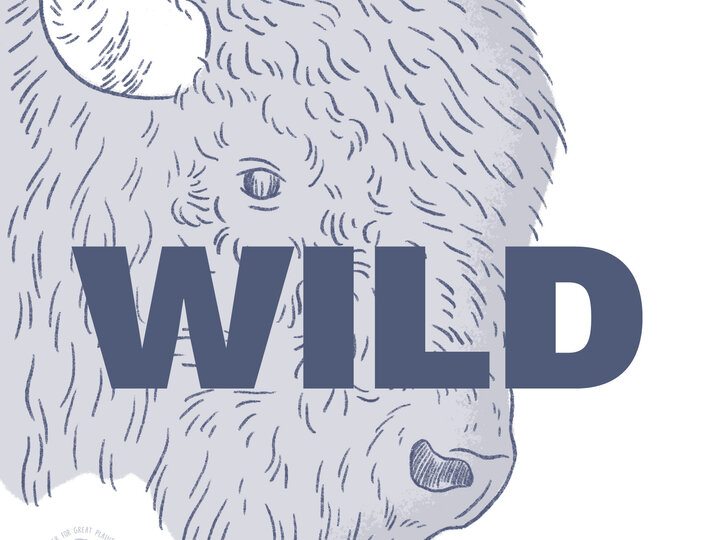
Conference photos
See our Facebook album for more conference photos. Above photo by Brady Karg, Spring Creek Prairie Audubon Center.
See album